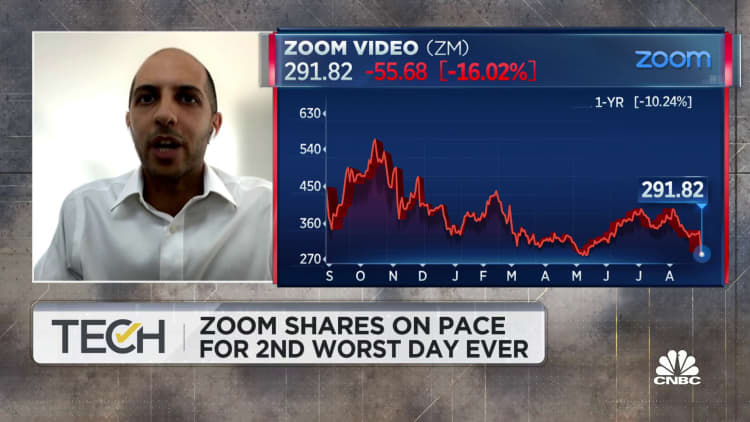Zoom's agreement to buy cloud contact center software company Five9 was scuttled on Thursday, after Five9 shareholders rejected the deal.
Zoom said in July that it was acquiring Five9 in an all-stock purchase for $14.7 billion, its first billion-dollar-plus purchase and, at the time, the second-biggest tech deal of the year. The company has now lost an opportunity to quickly broaden its capabilities after its stock rallied during the coronavirus pandemic.
Five9 shares fell 2% in extended trading following the statement from the companies.
Buying Five9 "presented an attractive means to bring to our customers an integrated contact center offering," Eric Yuan, Zoom's founder and CEO, wrote in a blog post. "That said, it was in no way foundational to the success of our platform, nor was it the only way for us to offer our customers a compelling contact center solution."
A branch of the U.S. Department of Justice was reviewing the deal out of concern about potential foreign participation, according to a letter dated Aug. 27 that was sent to the Federal Communications Commission. But Zoom said last week, when news of the review was reported, that it still expected the deal to close in the first half of 2022.
While some large tech acquisitions, most notably in the semiconductor industry, have been nixed of late by regulators, it's highly unusual for companies to willingly terminate their own deal.
Proxy advisory company Institutional Shareholder Services had recommended shareholders vote down the proposal, CNBC reported Sept. 17.
Zoom went public just two years ago, and the pandemic provided a major boon to its business, as customers rushed to sign up for its video chat software. The company had $1.9 billion in cash and equivalents on its balance sheet at the end of July.
Five9 also picked up customers that needed to set up remote and distributed call centers.
Five9 shareholders were ultimately unsatisfied with the small premium that Zoom was set to pay. At the agreed-upon price, they were only going to receive a 13% bump in the value of their shares over where they were trading prior to the agreement. Given the momentum in cloud software and all the money investors have poured into Five9's peers, a significantly higher premium was likely expected.
Additionally, Zoom's stock has dropped 28% since deal was announced, while Five9 shares have fallen only 11%. Because it's a stock swap, that means Five9 shareholders would have been receiving even less of a premium than at the agreed-upon price.
Microsoft's purchase of Nuance Communications for $19.7 billion, including debt, amounted to a 23% premium over Nuance's prior close. In what subsequently became the biggest tech deal of the year, Square agreed to buy Australia's Afterpay for $29 billion, equaling a 30% premium.
Zoom was looking to Five9 to reduce its dependence on the video and audio meetings that have become so popular within businesses and other organizations. Factoring in the impact it expected from Five9, Zoom executives told analysts earlier this month that they were looking at a $91 billion total addressable market in 2025, up from $34 billion in 2019.
Zoom and Five9, which had a product partnership prior to the acquisition agreement, said they will maintain support for the integrations.
— CNBC's Ari Levy contributed to this report.
WATCH: Is Zoom's run over?



